- Home
- Piers Anthony
Split Infinity Page 2
Split Infinity Read online
Page 2
For any given channel the colors seemed random, but for the arrangement as a whole they shaped in shifting contours roses, lilies, tulips, violets, and gardenias. Air jets emitted corresponding perfumes when applicable. An artist had designed this layout, and Stile admired the handiwork. He had been here many times before, yet the novelty had not worn off.
Sheen did not seem to notice. “On your mark,” she said, setting the random starter. The device could pop instantly or take two minutes. This time it split the difference. The channel barriers dropped low, and Sheen leaped for the chute nearest her.
Stile, surprised by her facility, leaped after her. They accelerated, shooting down feet first around a broad bright curve of green, then into the first white vertical loop. Up and over, slowing dizzily at the top, upside down, then regaining velocity in the downshoot.
Sheen was moving well. Her body had a natural rondure that shaped itself well to the contour of the chute. The dust piled up behind her, shoving her forward. Stile, following in the same channel, tried to intercept enough dust to cut off her supply and ground her, but she had too big a lead and was making too good use of her resources.
Well, there were other ways. This channel passed through a partial-gravity rise that was slow. Another channel crossed, going into a corkscrew. Stile took this detour, zipped through the screw, and shot out ahead of the girl.
She took another connection and got in behind him, cutting off his dust. This was the aspect of the Slide that was interactive: the competition for dust. Stile was grounded, his posterior scraping against the suddenly bare plastic of the chute. No dust, no progress!
He put his hand to the side, heaved, and flipped his body into the adjoining channel. This was a tricky maneuver, legitimate but not for amateurs. Here he had dust again, and resumed speed—but he had lost the momentum he had before. Sheen continued on in her channel, riding the piled dust, moving ahead of him—and now they were halfway down.
Stile realized that he had a real race on his hands. This girl was good!
He vaulted back into her channel, cutting off her dust again—but even as he did, she vaulted into his just-vacated channel, maintaining her lead. Apt move! Obviously she had raced here many times before, and knew the tricks, and had more agility under that sweet curvature of body than he had suspected. But now he had the better channel, and he was unmatchable in straight dust-riding; he moved ahead. She jumped across to cut him off, but he was already jumping into a third chute. Before she could follow him, the two diverged and he was safe.
They completed the race on separate channels. She had found a good one, and was gaining on him despite his careful management of dust. He finished barely ahead. They shot into the collection bin, one-two, to the applause of the other players who were watching. It had been a fine race, the kind that happened only once or twice on a given day.
Sheen got up and shook off the dust with a fascinating shimmy of her torso. “Can’t win them all,” she remarked, unperturbed.
She had made an excellent try, though! She had come closer than anyone in years. Stile watched her as she stripped off mask and shorts. She was stunningly beautiful—more so than before, because now he realized that her body was functional as well as shapely.
“You interest me,” he told her. In this aftermath of a good game he was flushed with positive feeling, his shyness at a minimum.
Sheen smiled. “I hoped to.”
“You almost beat me.”
“I had to get your attention somehow.”
Another player laughed. Stile had to laugh too. Sheen had proved herself, and now he wanted to know why. The mutual experience had broken the ice; the discovery of a new challenge completed his transition from diffidence to normal masculine imperative.
He didn’t even have to invite her to come home with him. She was already on her way.
CHAPTER 2
Sheen
Sheen moved into his apartment as if it were her own. She punched the buttons of his console to order a complete light lunch of fruit salad, protein bread, and blue wine.
“You evidently know about me,” Stile said as they ate. “But I know nothing of you. Why did you—want to get my attention?”
“I am a fan of the Game. I could be good at it. But I have so little time—only three years tenure remaining—I need instruction. From the best. From you. So I can be good enough—”
“To enter the Tourney,” Stile finished. “I have the same time remaining. But there are others you could have checked. I am only tenth on my ladder—”
“Because you don’t want to have to enter the Tourney this year,” she said. “You won’t enter it until your last year of tenure, because all tenure ends when a serf enters the Tourney. But you could advance to Rung One on the Age-35 ladder any time you wished, and the top five places of each adult ladder are automatically entered in the—”
“Thank you for the information,” Stile said with gentle irony.
She overlooked it. “So you keep yourself in the second five, from year to year, low enough to be safe in case several of the top rungers break or try to vacate, high enough to be able to make your move any time you want to. You are in fact the most proficient Gamesman of our generation—”
“This is an exaggeration. I’m a jockey, not a—”
“—and I want to learn from you. I offer—”
“I can see what you offer,” Stile said, running his eyes over her body. He could do this now without embarrassment, because he had come to know her; his initial shyness was swinging to a complementary boldness. They had, after all, Gamed together. “Yet there is no way I could inculcate the breadth of skills required for serious competition, even if we had a century instead of a mere three years. Talent is inherent, and it has to be buttressed by constant application. I might be able to guide you to the fifth rung of your ladder—which one would that be?”
“Age 23 female.”
“You’re in luck. There are only three Tourney-caliber players on that ladder at present. With proper management it would be possible for a person of promise to take one of the remaining rungs. But though you gave me a good race on the Slide, I am not sure you have sufficient promise—and even if you qualified for the Tourney, your chances of progressing far in it would be vanishingly small. My chances are not good—which is why I’m still working hard at every opportunity to improve myself. Contrary to your opinion, there are half a dozen players better than I am, and another score of my general caliber. In any given year, four or five of them will enter the Tourney, while others rise in skills to renew the pool. That, combined with the vagaries of luck, gives me only one chance in ten to win. For you—”
“Oh, I have no illusions about winning!” she said. “But if I could make a high enough rank to obtain extension of tenure, if only a year or two—”
“It’s a dream,” he assured her. “The Citizens put such prizes out as bait, but only one person in thirty-two gains even a year that way.”
“I would be completely grateful for that dream,” she said, meeting his gaze.
Stile was tempted. He knew he would not have access to a more attractive woman, and she had indeed shown promise in the Game. That athletic ability that had enabled her so blithely and lithely to change chutes would benefit her in many other types of competition. He could have a very pleasant two years, training her. Extremely pleasant.
That itself gave him caution. He had loved before, and lost, and it had taken years to recover completely—if he really had. Tune, he thought, with momentary nostalgia. There were ways in which Sheen resembled that former girl.
Still, what promise did he have beyond his remaining three years, anyway? All would be lost, once he left Proton. Oh, he would have a nice nest egg to establish galactic residence, and might even go to crowded Earth itself, but all he really wanted to do was remain on Proton. Since it was unlikely that he could do that, he might as well make these years count. She had mentioned that her own tenure was as short as his, which
meant she would have to leave at the same time. That could be very interesting, if they had a firm relationship. “Tell me about yourself,” he said.
“I was born five years before my parents’ tenure ended,” Sheen said, putting down her leaf of lettuce. She had eaten delicately and quite sparingly, as many slender women did. “I obtained a position with a Lady Citizen, first as errand girl, then as nurse. I was a fan of the Game as a child, and had good aptitude, but as my employer grew older she required more care, until—” She shrugged, and now with the pleasant tingle of the wine and the understanding they were coming to, he could appreciate the way her breasts moved with that gesture. Oh yes, it was a good offer she made—yet something nagged him. “I have not been to a Game for seven years,” she continued, “though I have viewed it often on my employer’s screens, and rehearsed strategies and techniques constantly in private. My employer had a private exercise gym her doctor recommended; she never used it, so I did, filling in for her. Last week she died, so I have been released on holiday pending settlement of her estate and the inventory her heir is taking. Her heir is female, and healthy, so I do not think the burden will be onerous.”
It could have been quite a different matter, Stile reflected, with a young, healthy male heir. Serfs had no personal rights except termination of tenure in fit physical and mental condition, and no sane person would depart Proton even a day ahead of schedule. Serfs could serve without concern as concubines or studs for their employers—or for each other as private or public entertainment for their employers. Their bodies were the property of the Citizens. Only in privacy, without the intercession of a Citizen, did interpersonal relations between serfs become meaningful. As now.
“So you came to me,” Stile said. “To trade your favors for my favor.”
“Yes.” There needed to be no hesitancy or shame to such acknowledgment. Since serfs had no monetary or property credit, and no power during their tenure, Game-status and sex were the chief instruments of barter.
“I am minded to try it out. Shall we say for a week, then reconsider? I might become tired of you.”
Again there was no formal cause for affront; male-female interactions among serfs were necessarily shallow, though marriage was permitted and provided for. Stile had learned the hard way, long ago, not to expect permanence. Still, he expected a snappy retort to the effect that she would more likely grow tired of him first.
There was no such byplay. “As part of my rehearsal for the Game, I have studied the art of pleasing men,” Sheen said. “I am willing to venture that week.”
A fair answer. And yet, he wondered, would not an ordinary woman, even the most abused of serfs, have evinced some token ire at the callousness of his suggestion? He could have said, “We might not be right for each other.” He had phrased it most bluntly, forcing a reaction. Sheen had not reacted; she was completely matter-of-fact. Again he was nagged. Was there some catch here?
“Do you have special interests?” Stile inquired. “Music?” He hadn’t really wanted to ask that, but it had come out. He associated love with music, because of his prior experience.
“Yes, music,” Sheen agreed.
His interest quickened. “What kind?”
She shrugged again. “Any kind.”
“Vocal? Instrumental? Mechanical?”
Her brow furrowed. “Instrumental.”
“What instrument do you play?”
She looked blank.
“Oh—you just listen,” he said. “I play a number of instruments, preferring the woodwinds. All part of the Game. You will need to acquire skill in at least one instrument, or Game opponents will play you for a weakness there and have easy victories.”
“Yes, I must learn,” she agreed.
What would she have done if he had gone for ART instead of PHYSICAL in their match? With her prior choice of NAKED, the intersection would have put them in song, dance, or story: the a capella performances. Perhaps she was a storyteller. Yet she did not seem to have the necessary imagination.
“Let’s do it right,” he said, rising from his meal. “I have a costume—” He touched a button and the costume fell from a wall vent into his hand. It was a filmy negligee.
Sheen smiled and accepted it. In the privacy of an apartment, clothing was permitted, so long as it was worn discreetly. If there should be a video call, or a visitor at his door, Sheen would have to hide or rip off the clothing lest she be caught by a third party in that state and be compromised. But that only added to the excitement of it, the special, titillating naughtiness of their liaison. It was, in an unvoiced way, the closest any serf could come to emulating any Citizen.
She donned the costume without shame and did a pirouette, causing the material to fling out about her legs. Stile found this indescribably erotic. He shut down the light, so that the material seemed opaque, and the effect intensified. Oh, what clothing did for the woman, creating shadows where ordinarily there were none, making mysteries where none had been before!
Yet again, something ticked a warning in Stile’s mind. Sheen was lovely, yes—but where was her flush of delighted shame? Why hadn’t she questioned his possession of this apparel? He had it on loan, and his employer knew about it and would in due course remember to reclaim it—but a person who did not know that, who was not aware of the liberalism of this particular employer with respect to his favored serfs, should be alarmed at his seeming hoarding of illicit clothing. Sheen had thought nothing of it.
They were technically within the law—but so was a man who thought treason without acting on it. Stile was an expert Gamesman, attuned to the nuances of human behavior, and there was something wrong with Sheen. But what was it? There was really nothing in her behavior that could not be accounted for by her years of semi-isolation while nursing her Citizen.
Well, perhaps it would come to him. Stile advanced on Sheen, and she met him gladly. None of this oh-please-don’t-hurt-me-sir, catch-me-if-you-can drama. She was not after all very much taller than he, so he had to draw her down only marginally to kiss her. Her body was limber, pliable, and the feel of the gauze between their skins pitched him into a fever of desire. Not in years had he achieved such heat so soon.
She kissed him back, her lips firm and cool. Suddenly the little nagging observations clicked into a comprehensible whole, and he knew her for what she was. Stile’s ardor began sliding into anger.
He bore her back to the couch-bed. She dropped onto it easily, as if this type of fall were commonplace for her. He sat beside her, running his hands along her thighs, still with that tantalizing fabric in place between them. He moved on to knead her breasts, doubly erotic behind the material. A nude woman in public was not arousing, but a clothed one in private …
His hands were relaxed, gentle—but his mind was tight with coalescing ire and apprehension. He was about to trigger a reaction that could be hazardous to his health.
“I would certainly never have been able to tell,” he remarked.
Her eyes focused on him. “Tell what, Stile?”
He answered her with another question. “Who would want to send me a humanoid robot?”
She did not stiffen. “I wouldn’t know.”
“The information should be in your storage banks. I need a printout.”
She showed no emotion. “How did you discover that I was a robot?”
“Give me that printout, and I’ll give you my source of information.”
“I am not permitted to expose my data.”
“Then I shall have to report you to Game-control,” Stile said evenly. “Robots are not permitted to compete against humans unless under direct guidance by the Game Computer. Are you a Game-machine?”
“No.”
“Then I fear it will go hard with you. The record of our Game has been entered. If I file a complaint, you will be deprogrammed.”
She looked at him, still lovely though he now knew her nature. “I wish you would not do that, Stile.”
How strong was her progr
ammed wish? What form would her objection take, when pressed? It was a popular fable that robots could not harm human beings, but Stile knew better. All robots of Proton were prohibited from harming Citizens, or acting contrary to Citizens’ expressed intent, or acting in any manner that might conceivably be deleterious to the welfare of any Citizen—but there were no strictures about serfs. Normally robots did not bother people, but this was because robots simply did not care about people. If a serf interfered with a robot in the performance of its assignment, that man could get hurt.
Stile was now interfering with the robot Sheen. “Sheen,” he said. “Short for Machine. Someone with a certain impish humor programmed you.”
“I perceive no humor,” she said.
“Naturally not. That was your first giveaway. When I proffered you a draw on the Slide, you should have laughed. It was a joke. You reacted without emotion.”
“I am programmed for emotion. I am programmed for the stigmata of love.”
The stigmata of love. A truly robotic definition! “Not the reality?”
“The reality too. There is no significant distinction. I am here to love you, if you will permit it.”
So far she had shown no sign of violence. That was good; he was not at all sure he could escape her if she attacked him. Robots varied in physical abilities, as they did in intellectual ones; it depended on their intended use and the degree of technology applied. This one seemed to be of top-line sophistication; that could mean she imitated the human form and nature so perfectly she had no more strength than a real girl would have. But there was no guarantee. “I must have that printout.”
“I will tell you my mission, if you will not expose my nature.”
“I can not trust your word. You attempted to deceive me with your story about nursing a Citizen. Only the printout is sure.”
“You are making it difficult. My mission is only to guard you from harm.”
“I feel more threatened by your presence than protected. Why should I need guarding from harm?”

 Serial
Serial Question Quest
Question Quest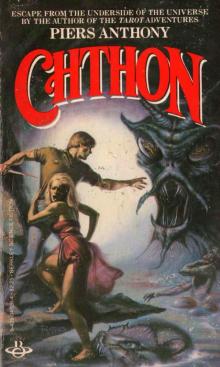 Chthon
Chthon Dragon on a Pedestal
Dragon on a Pedestal E. S. P. Worm
E. S. P. Worm Hope of Earth
Hope of Earth The Series Boxed Set
The Series Boxed Set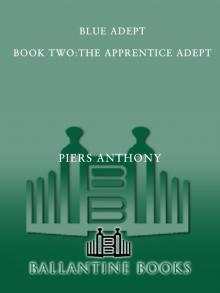 Blue Adept
Blue Adept The Sopaths
The Sopaths Beetle Juice
Beetle Juice Awares
Awares Golem in the Gears
Golem in the Gears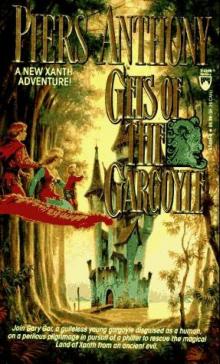 Geis of the Gargoyle
Geis of the Gargoyle Bamboo Bloodbath and Ninja's Revenge
Bamboo Bloodbath and Ninja's Revenge Heaven Cent
Heaven Cent Neq the Sword
Neq the Sword Pandora Park
Pandora Park Juxtaposition
Juxtaposition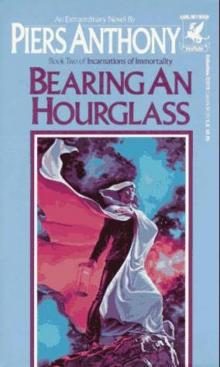 Bearing an Hourglass
Bearing an Hourglass Dragon Assassin
Dragon Assassin Board Stiff
Board Stiff Virtual Mode
Virtual Mode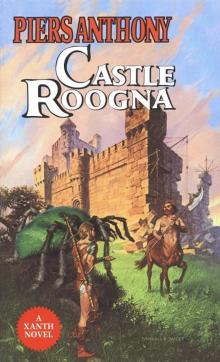 Castle Roogna
Castle Roogna Aliena Too
Aliena Too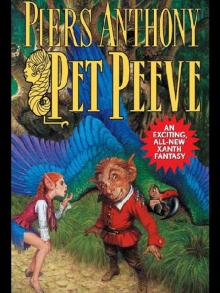 Pet Peeve
Pet Peeve The Metal Maiden Collection
The Metal Maiden Collection Volk
Volk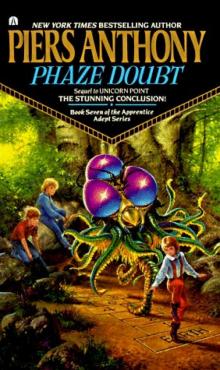 Phaze Doubt
Phaze Doubt The Color of Her Panties
The Color of Her Panties Amazon Slaughter and Curse of the Ninja Piers Anthony
Amazon Slaughter and Curse of the Ninja Piers Anthony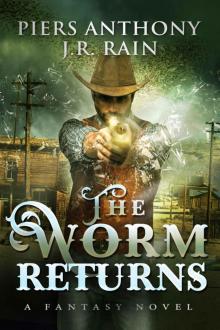 The Worm Returns
The Worm Returns Zombie Lover
Zombie Lover Xone of Contention
Xone of Contention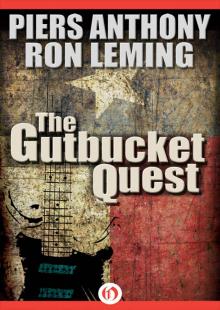 The Gutbucket Quest
The Gutbucket Quest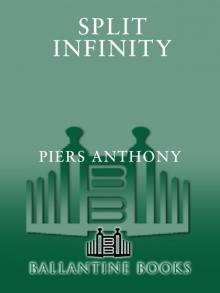 Split Infinity
Split Infinity Dream a Little Dream: A Tale of Myth and Moonshine
Dream a Little Dream: A Tale of Myth and Moonshine Balook
Balook Out of Phaze
Out of Phaze The Secret of Spring
The Secret of Spring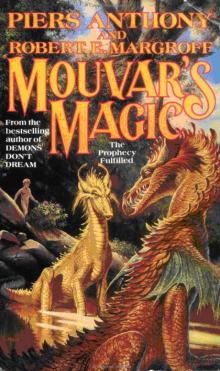 Mouvar's Magic
Mouvar's Magic Cube Route
Cube Route Mercenary
Mercenary Total Recall
Total Recall Man From Mundania
Man From Mundania The Magic Fart
The Magic Fart Letters to Jenny
Letters to Jenny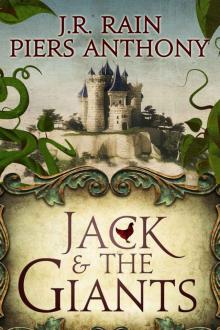 Jack and the Giants
Jack and the Giants Executive
Executive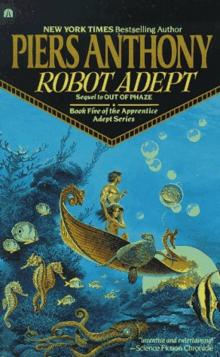 Robot Adept
Robot Adept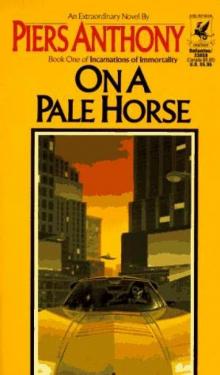 On A Pale Horse
On A Pale Horse Vale of the Vole
Vale of the Vole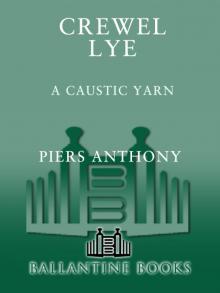 Crewel Lye
Crewel Lye For Love of Evil
For Love of Evil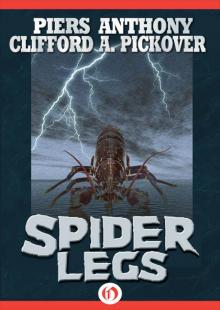 Spider Legs
Spider Legs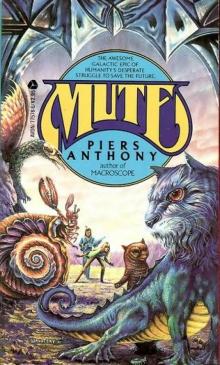 Mute
Mute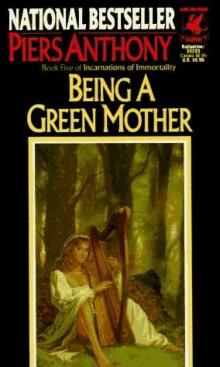 Being a Green Mother
Being a Green Mother Hair Suite
Hair Suite Air Apparent
Air Apparent Politician
Politician Aliena
Aliena Phthor
Phthor Ghost Writer in the Sky
Ghost Writer in the Sky Pornucopia
Pornucopia Eroma
Eroma Shepherd
Shepherd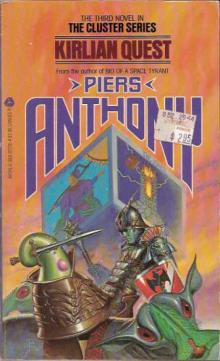 Kirlian Quest
Kirlian Quest Swell Foop
Swell Foop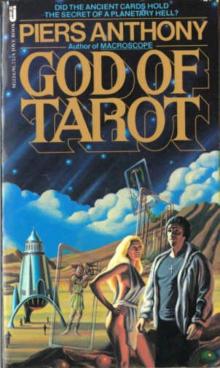 God of Tarot
God of Tarot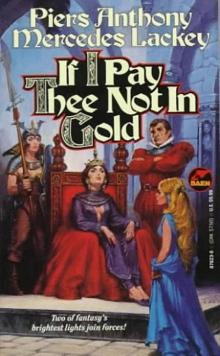 If I Pay Thee Not in Gold
If I Pay Thee Not in Gold Amazon Expedient
Amazon Expedient Faun & Games
Faun & Games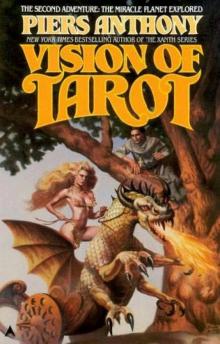 Vision of Tarot
Vision of Tarot Centaur Aisle
Centaur Aisle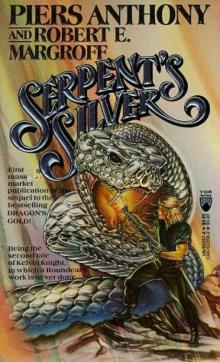 Serpent's Silver
Serpent's Silver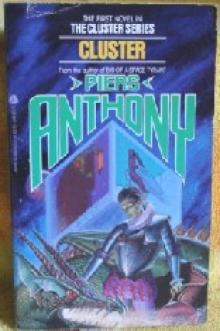 Cluster
Cluster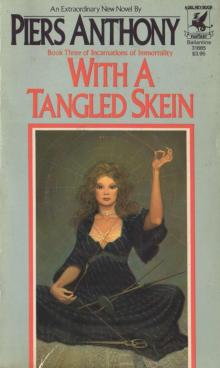 With a Tangled Skein
With a Tangled Skein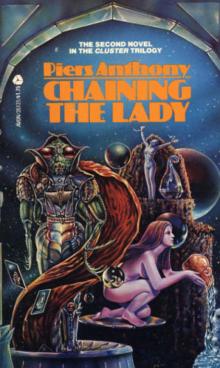 Chaining the Lady
Chaining the Lady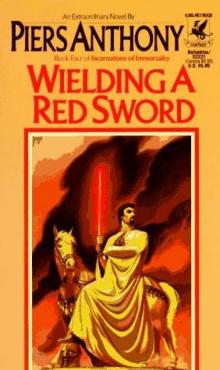 Wielding a Red Sword
Wielding a Red Sword Key to Chroma
Key to Chroma WereWoman
WereWoman Isis Orb
Isis Orb Hair Peace
Hair Peace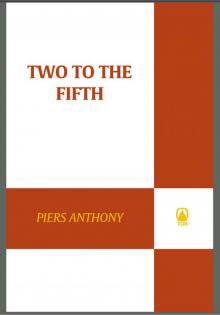 Two to the Fifth
Two to the Fifth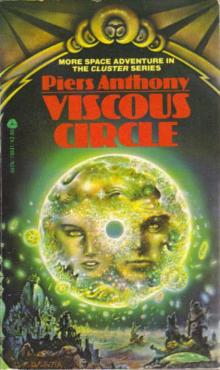 Viscous Circle
Viscous Circle Skeleton Key
Skeleton Key Cautionary Tales
Cautionary Tales The Source of Magic
The Source of Magic Unicorn Point
Unicorn Point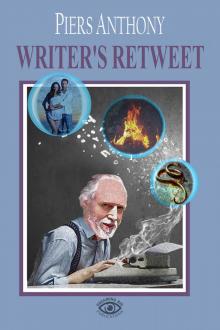 Writer's Retweet
Writer's Retweet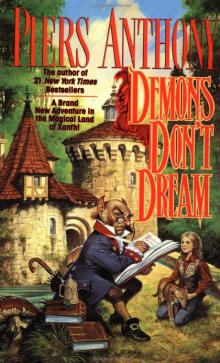 Demons Don't Dream
Demons Don't Dream Ogre, Ogre
Ogre, Ogre The Iron Maiden
The Iron Maiden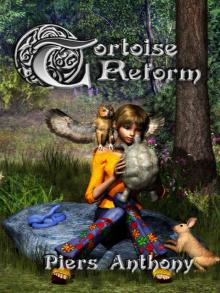 Tortoise Reform
Tortoise Reform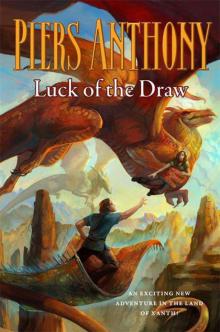 Luck of the Draw
Luck of the Draw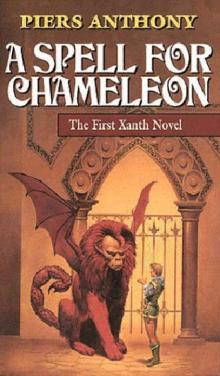 A Spell for Chameleon
A Spell for Chameleon Yon Ill Wind
Yon Ill Wind Currant Events
Currant Events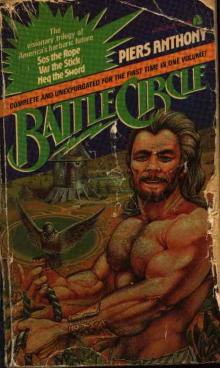 Var the Stick
Var the Stick And Eternity
And Eternity Kiai! & Mistress of Death
Kiai! & Mistress of Death Chimaera's Copper
Chimaera's Copper Refugee
Refugee Isle of View
Isle of View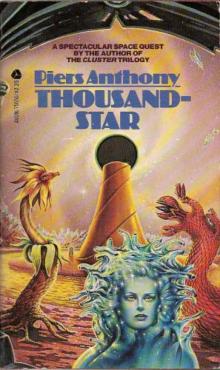 Thousandstar
Thousandstar Mer-Cycle
Mer-Cycle Service Goat
Service Goat Five Portraits
Five Portraits Night Mare
Night Mare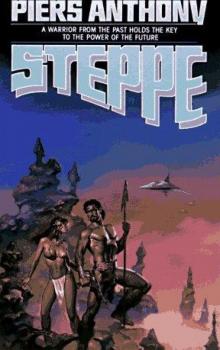 Steppe
Steppe Lavabull
Lavabull Well-Tempered Clavicle
Well-Tempered Clavicle Aladdin Relighted
Aladdin Relighted Aladdin and the Flying Dutchman
Aladdin and the Flying Dutchman Knot Gneiss
Knot Gneiss Roc and a Hard Place
Roc and a Hard Place Aladdin Sins Bad
Aladdin Sins Bad Flytrap
Flytrap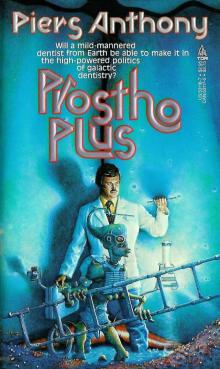 Prostho Plus
Prostho Plus Esrever Doom
Esrever Doom Hair Power
Hair Power The Journey
The Journey Virtue Inverted
Virtue Inverted Of Man and Manta Omnibus
Of Man and Manta Omnibus Trail Mix: Amoeba
Trail Mix: Amoeba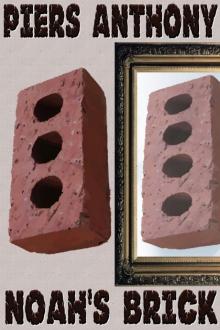 Noah's Brick
Noah's Brick Odd Exam
Odd Exam Magenta Salvation
Magenta Salvation Jest Right
Jest Right Fire Sail
Fire Sail Chthon a-1
Chthon a-1 Amoeba
Amoeba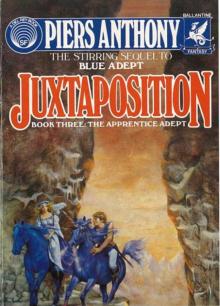 Juxtaposition aa-3
Juxtaposition aa-3 Pira
Pira THE CATERPILLARS QUESTION
THE CATERPILLARS QUESTION What Fears Become: An Anthology from The Horror Zine
What Fears Become: An Anthology from The Horror Zine Bio of a Space Tyrant Vol. 3. Politician
Bio of a Space Tyrant Vol. 3. Politician Ogre Ogre x-5
Ogre Ogre x-5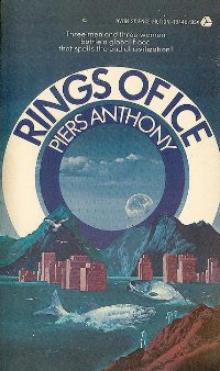 Rings of Ice
Rings of Ice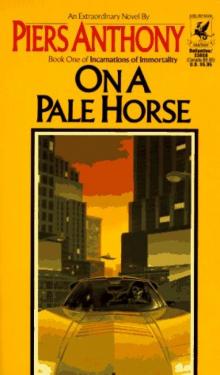 On a Pale Horse ioi-1
On a Pale Horse ioi-1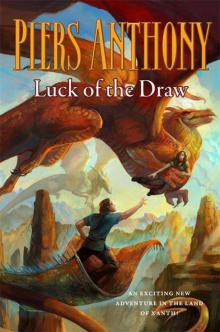 Luck of the Draw (Xanth)
Luck of the Draw (Xanth) Centaur Aisle x-4
Centaur Aisle x-4 Thousandstar (#4 of the Cluster series)
Thousandstar (#4 of the Cluster series)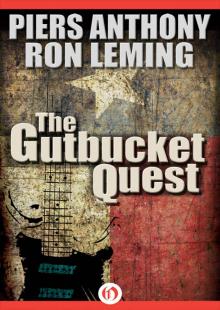 Gutbucket Quest
Gutbucket Quest Isle of Woman (Geodyssey)
Isle of Woman (Geodyssey)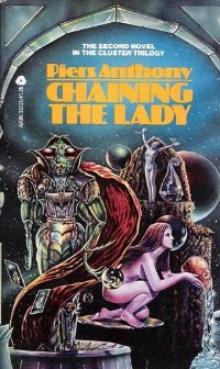 Chaining the Lady c-2
Chaining the Lady c-2 To Be a Woman
To Be a Woman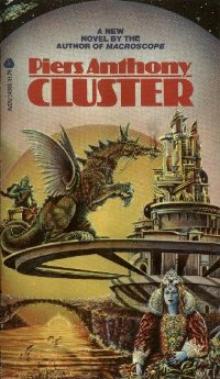 Cluster c-1
Cluster c-1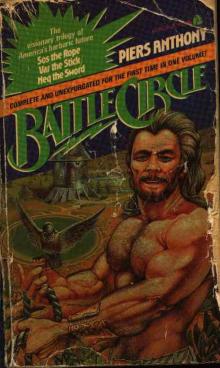 Battle Circle 2 - Var the Stick
Battle Circle 2 - Var the Stick Mercenary (Bio of a Space Tyrant Book 2)
Mercenary (Bio of a Space Tyrant Book 2)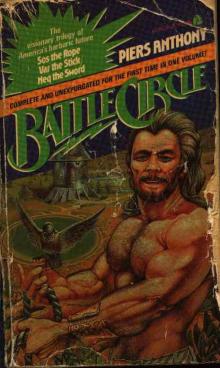 Battle Circle 1 - Sos the Rope
Battle Circle 1 - Sos the Rope Xanth 30 - Stork Naked
Xanth 30 - Stork Naked Secret of Spring
Secret of Spring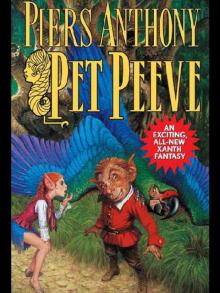 Xanth 29 - Pet Peeve
Xanth 29 - Pet Peeve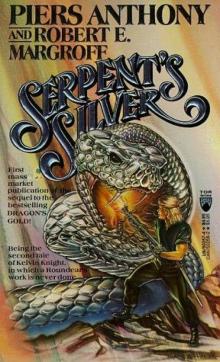 Serpents's Silver
Serpents's Silver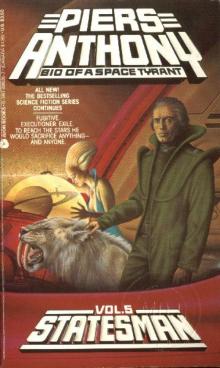 Statesman by Piers Anthony
Statesman by Piers Anthony Out of Phaze aa-4
Out of Phaze aa-4 Amazon Slaughter & Curse of the Ninja
Amazon Slaughter & Curse of the Ninja